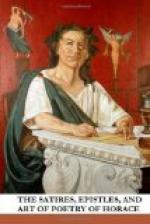PREFACE.
In venturing to follow up my translation of the Odes of Horace by a version of the Satires and Epistles, I feel that I am in no way entitled to refer to the former as a justification of my boldness in undertaking the latter. Both classes of works are doubtless explicable as products of the same original genius: but they differ so widely in many of their characteristics, that success in rendering the one, though greater than any which I can hope to have attained, would afford no presumption that the translator would be found to have the least aptitude for the other. As a matter of fact, while the Odes still continue to invite translation after translation, the Satires and Epistles, popular as they were among translators and imitators a hundred years ago, have scarcely been attempted at all since that great revolution in literary taste which was effected during the last ten years of the last century and the first ten years of the present. Byron’s Hints from Horace, Mr. Howes’ forgotten but highly meritorious version of the Satires and Epistles, to which I hope to return before long, and a few experiments by Mr. Theodore Martin, published in the notes to his translation of the Odes and elsewhere, constitute perhaps the whole recent stock of which a new translator may be expected to take account. In one sense this is encouraging: in another dispiriting. The field is not pre-occupied: but the reason is, that general opinion has pronounced its cultivation unprofitable and hopeless.
No doubt, apart from fluctuations in the taste of the reading public, there are special reasons why a version of this portion of Horace’s works should be a difficult, perhaps an impracticable undertaking. It would not be easy to maintain that a Roman satirist was incapable of adequate representation in English in the face of such an instance to the contrary as Gifford’s Juvenal, probably, take it all in all, the very best version of a classic in the language. But though Juvenal has many passages which sufficiently remind us of Horace, some of them light and playful, others level and almost flat, these do not form the staple of his Satires: there are passages of dignified declamation and passionate invective which suffer less in translation, and which may be so rendered as to leave a lasting impression of pleasure upon the mind of the reader. Like Horace, he has an abundance of local and temporary allusions, in dealing with which the most successful translator is the one who fails least: unlike Horace, when he quits the local and the temporary, he generally quits also the language of persiflage, and abandons himself unrestrainedly to feeling. Persiflage, I suppose, even in ordinary life, is much less easy to practise with perfect success than a graver and less artificial mode of speaking, though, perhaps for that very reason, it is apt to be more sought after: the persiflage of a writer




